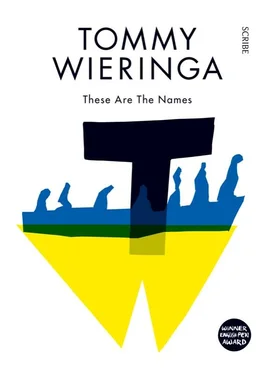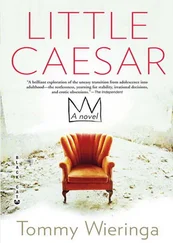‘You say I’m the last one you’ll talk to,’ said Alexander Haç. ‘So how come you still don’t know who you’re dealing with?’
‘So who am I dealing with?’ Beg asked in irritation.
‘You have no idea how often we fell asleep in the certainty that there would be no tomorrow. We’re dead people. You can’t get to us.’
Beg stifled a belch. The sweet chewing-gum taste of the energy drink swirled in his mouth. ‘Let me tell you something weird,’ he said. ‘I really don’t care all that much who murdered him and who cut off his head and all that. They’ll find out all about that when you get there. For me, the point is … what I want to know …’ He was silent for a moment. ‘Maybe I should ask this first,’ he said then. ‘Do you believe? In a god?’
The man’s eyes clouded over. He shrugged.
‘I,’ Beg said, ‘… not so long ago, I myself found the way that leads to the Everlasting. Lots of things still aren’t clear to me, but I have to say that I … well, that I’ve embraced a faith. It’s a long story, it’s all still pretty fresh, but what matters to me is this …’
Then he told the man about the exodus. How the Israelites were led by a pillar of cloud by day, and a pillar of fire by night. The sea had parted to let them through. For forty years it had rained food, always just enough for one day at a time. ‘We all know the story,’ Beg said, ‘but what I didn’t know was that all that time they were carrying the bones of one of their forefathers. Joseph, who had made them promise to bury him in the Promised Land … Hundreds of years later, and they still remembered … That kind of faithfulness, that kind of breathtaking faithfulness …’
He felt his eyes burning.
‘So?’ the man asked. ‘Did they bury him when they got home?’
Beg nodded. ‘He entered the Promised Land. He did … but not Moses, who had the most right to. The reason I’m telling you this, though … the Ethiopian. Why was it necessary for him to die? Why was it necessary for you people to keep him with you? It must have been important to you, otherwise you wouldn’t do something like that. Tell me what importance he has for you people. Only that.’
Haç sat motionless. It looked like he had stopped breathing.
‘We lived with wonders all around us,’ he said slowly. ‘Once they started, we never doubted that we were going to be saved. These things are impossible to talk about. They’re only important to the ones who were there — those who passed through the thicket of horrors.’
‘What is that, this thicket?’
‘You keep on asking questions, as though there’s an answer to everything.’
‘You’re the one who started talking about the thicket of horrors. I’m asking you what it means.’
But the man across from him was sunk in thought. He seemed to be wandering amid his memories, a bit amazed at the things he saw there.
Beg’s suspicion of idolatry grew and became increasingly concrete — a thing they couldn’t talk about, because every faith shivers and shrinks under the cold lamplight of inspection.
‘After we killed him,’ the man said suddenly, ‘the boy’s dreams started. He dreamed the way for us. The woman said they came from him. She could interpret them. The boy told them, and she understood them.’
‘So you’re saying … who did these dreams come from?’
The man grimaced. ‘From Africa. Who else? He sent them so that we would know the way. I swear, we walked straight to it.’
‘To what?’
‘The woman said we had to start going south. All that time we’d been heading west; now suddenly we had to go the other way. I didn’t want to — once you choose a direction, you have to keep following it, otherwise you go completely nuts. But they were so sure of themselves. I figured … well, what if it’s true … That he’s the one telling them … Who am I to … Then we found the village. That’s what saved us.’
‘So you’re telling me the black man sent those dreams?’
‘They started once he was dead.’
‘Then why did he have to die, if the things he did were good?’
‘You don’t get it. It wasn’t always like that. At first he was in the service of evil. He did bad things. He ate from the tall man’s body. He was covered in sores, because of him. We saw all of that. And Vitaly’s arm almost fell off, at the place where he’d touched him. It rotted all the way through. If you think back on it, that whole trip …’
‘He ate from someone else’s body?’ Beg asked. He tried to suppress his disgust — and his deep-rooted bafflement.
‘He sank his teeth into it, oh yeah.’
‘And you all saw him do that?’
‘Cannibals, right? The blacks. Always have been. Couldn’t have been anything else.’
Occasionally, Beg was granted a glimpse of the thicket of horrors — flashes, already gone before he could actually feel the despair.
‘Tell me about the village,’ he said.
CHAPTER THIRTY-FOUR.The rooster
Three of the four had been for it; only he, the poacher, was against. Vitaly didn’t count any more; lightning had struck in his head. For the first time in weeks, they turned from their route and walked south. They were following a dream, a vision of salvation — if they found no deliverance, the men would kill the woman and the boy. Winter had started, and in the mornings their bodies were covered with frost.
As darkness began falling on the fifth day, they saw rows of trees rising up from the plains — the tall trunks of poplars, the civilisation of trees. Someone had planted them, and the current in ditches had watered their roots. They stood there like that, an outer ring of protection against the wind and sand off the steppes.
But the trees were dead.
Behind them they found abandoned farmhouses. They wandered through the streets of the hamlet, the wind blowing through windows and doorways. There were no lights anywhere, not a living soul in sight. The wind had piled sand against the walls; grass and bushes had advanced into the streets themselves.
They built a fire on the dirt floor of a house. They warmed their hands at the flames. Why had the people abandoned their homes? What disaster had made them flee? Where had they gone?
Their shadows danced on the walls. They had found nothing to eat, but this night they would not freeze to death.
It was still dark, the final coals glowing amid the ashes. They pricked up their ears in their sleep. The sound they had heard was unmistakeable.
A rooster. Somewhere a rooster crowed. And again.
Somebody fumbled around, trying to sit upright. The others moved restlessly on the floor.
They had heard a rooster — the last living rooster in the world.
‘Fuck,’ the poacher said in the dark.
With a groan, he rose to his feet and left the house. The woman laid wood on the fire, and fanned the coals. One by one they rose, shattered, stiff; the underfed body cannibalises itself, devours its own muscles.
Grimy light was coming through the windows; outside, they occasionally heard the cock’s crow. In the attic, the man from Ashkhabad was ripping up planks for the fire; it was hard work. Downstairs, the others sat in a cloud of black, sticky dust that clogged their windpipes. The fire leapt up. Vitaly raved.
The poacher came in, cold sweat on his forehead.
In the distance, the rooster crowed.
‘I can’t get hold of him,’ he panted. He rested, his hands on his thighs. ‘Someone else has to go with me. That bastard is in good shape.’
He shuffled up to the fire, enraged by his defeat.
After a while, the boy spoke up. He asked: ‘So who takes care of the rooster, anyway?’
Читать дальше











